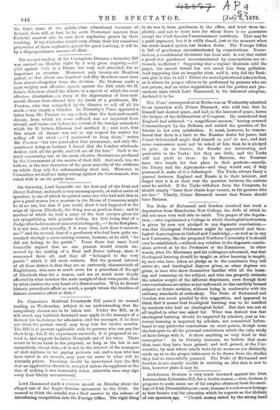On Saturday, Lord Granville cut the first sod of the
Deal and Dover Railway, and made a very amusing speech, or rather series of speeches, in one of which he quoted some one who had said that to give a good reason for a measure in the House of Commons might be of no use, but that if you could show it had happened in the reign of Queen Elizabeth, the thing was as good as done ; and in another of which he told a story of the best. excuses given for not sympathising with popular feeling, the first being that of a Judge who had remained unmoved at a tragedy, —" In the first place, it is not true, and secondly, if it were true, how does it concern me ?" and the second, that of a gentleman who had been quite un- touched through a most moving sermon, because, as he said, "he did not belong to the parish." From these last cases Lord Granville argued that no one present would remain un- moved by the making of a Deal and Dover railway, since it concerned them all, and they all "belonged to the very parish" which it did most concern. But the general interest of all these stories is that they are so extremely characteristic of Englishmen, who care so much more for a precedent of the age of Elizabeth than for a reason, and are so much more deeply affected by what touches the mere margin of their own parish, than by what touches the very heart of a distant nation. Why do distant historic precedents affect so much, a people whom the troubles of distant countries affect so little?


































 Previous page
Previous page